Stormont: Sinn Féin says there can be no return to direct rule
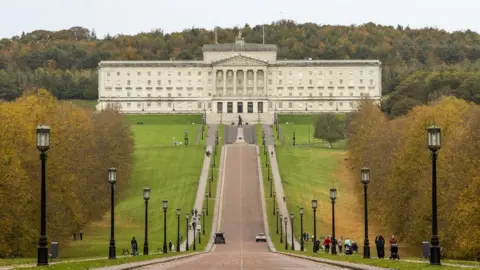 PA Media
PA MediaSinn Féin vice-president Michelle O'Neill has said there can be no return to direct rule from London if parties fail to reform Stormont's government.
She said her priority was to restore the assembly and its ruling executive but warned the "clock is ticking".
She called for a "joint approach" between London and Dublin if devolution cannot be salvaged.
But the Democratic Unionist Party (DUP) leader warned any suggestion of joint authority would do "enormous harm".
"Joint authority would not be consistent with the Belfast Agreement and I'm not going to be threatened and bullied by Sinn Féin or anyone else on this issue," said Sir Jeffrey Donaldson.
SDLP leader Colum Eastwood has made a similar call to Ms O'Neill and urged other party leaders to support a proposed joint authority, if the Stormont institutions cannot be restored.
Northern Ireland's main political parties have been holding talks with Secretary of State Chris Heaton-Harris in a bid to get the Stormont executive working again ahead of his deadline on Friday.
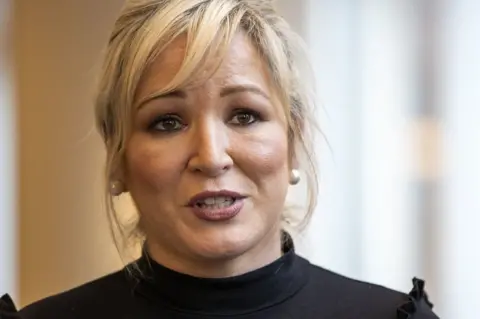 PA Media
PA MediaFollowing those meetings, Mr Heaton-Harris said he has been "consistently clear" that he will call an election "if the Executive is not formed by 28 October".
"Time is running out, and people in Northern Ireland deserve locally-elected decision-makers and an executive who can respond to the issues facing people, families and communities across Northern Ireland during this challenging time," he said.
"We are clear that people deserve an accountable devolved government and that was my message to party leaders today."
The DUP has been blocking the formation of a new executive since May's assembly election as part of its ongoing protest over the Northern Ireland Protocol - the Brexit trade deal between the UK and EU.
Parties meet NI secretary in Belfast
Speaking in Belfast on Wednesday following a meeting with the secretary of state, Ms O'Neill said "even at this late hour" her main focus was to get Stormont back up and running.
But she said in the case that power-sharing could not be saved by Friday's deadline, Northern Ireland would not "return to direct rule of the past".
"We're not going back to the days of London ruling our affairs here.
"There's very much a role for joint partnership between London and Dublin, that's where we're headed in the event of things not being up and running."
The Sinn Féin vice-president said Mr Heaton-Harris was clear in their meeting that Northern Ireland would be on course for another election if power-sharing was not restored.
She said "there's a small window" for the DUP to change their mind and get back into government, but believes it is highly unlikely.
After meeting the Northern Ireland secretary on Tuesday, Sir Jeffrey said it appeared that the UK government was determined to call another Stormont election.
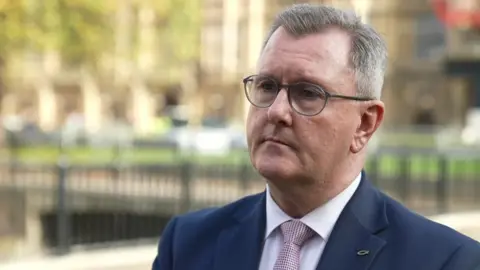
"I think the government has set its mind on having an election, if it is called, we will fight that," he said.
"But I don't think this moves us any closer to getting the institutions restored; I don't see what this election will do to change things."
Sir Jeffrey rejected suggestions that his party would be at fault if an election was called, because it is refusing to end its protest over the protocol.
"It's the government's decision, not mine, and I don't accept that's the case," he said.
"What the government should be doing is focusing on getting a solution that enables the institutions to be restored."
He also said any suggestion of joint authority between London and Dublin, in the event Northern Ireland's devolved government does not return, would do "enormous harm".
UUP and Alliance critical over election
Ulster Unionist Party (UUP) leader Doug Beattie said he firmly rejects any notion of joint authority, saying it "would clearly be a massive change in our constitutional status".
Speaking before his meeting with the secretary of state, he added that "calling an election will not achieve any of what we want to achieve".
He criticised the Northern Ireland Office (NIO) and UK government for not understanding that they should take "nuanced decisions" on Northern Ireland.
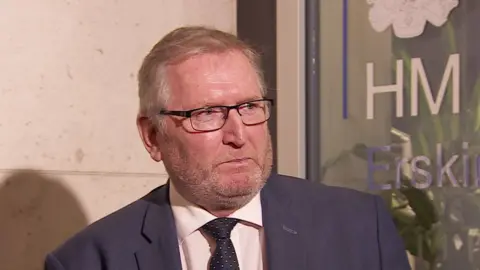
However, he said he was not hopeful that Mr Heaton-Harris would change his mind.
Alliance Party leader Naomi Long said she urged the secretary of state to reconsider calling an election when she met with him on Wednesday, adding that going to the polls again would not resolve Northern Ireland's issues.
Ms Long said she told Mr Heaton-Harris there were other steps he could take rather than an election, such as dealing with the repetitive cycle of calling elections and tackling assembly members being paid salaries when Stormont is not sitting.
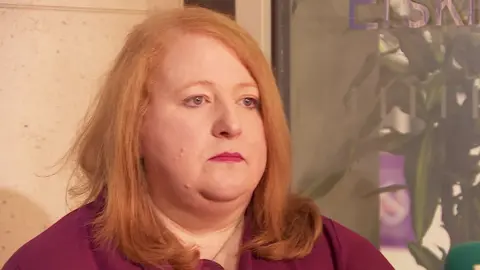
"If we do not reform our institutions we could be back here again," she added.
"There was only one thing that allowed the last mandate to last two and a half years and that was Covid because nobody could walk out on a global pandemic.
"We need to reform the institutions to ensure no single party can do this again."
Earlier, in a statement, Social Democratic and Labour Party (SDLP) leader Colum Eastwood said he had written to each party leader asking them to back joint authority "to provide stability in the months ahead".
He said a "failure to acknowledge the active role the Irish government currently plays" in Northern Ireland would be "disingenuous in the extreme".
Election looms with time running out
The assembly will meet at midday on Thursday, just 12 hours ahead of the deadline for appointing ministers.
A failure to meet that deadline would place a legal responsibility on the government to call an assembly election within 12 weeks.

What happens if the election deadline is missed?
The rules state that the Northern Ireland secretary must call an election "as soon as is practicable".
That does not mean he must call an election on 28 October, contrary to what he has repeatedly said.
The rules do say the election must be held within 12 weeks, which would mean the second assembly election in the space of a year.
However previous deadlines in Northern Ireland have been adjusted by emergency legislation at Westminster.

Northern Ireland Secretary Chris Heaton-Harris, who was re-appointed to his role along with minister for state Steve Baker at the Northern Ireland Office by Prime Minister Rishi Sunak, is under no obligation to trigger the poll immediately.
However, the DUP has said it cannot return to power-sharing until its concerns about the protocol are addressed.
The post-Brexit trade deal struck in 2019 keeps Northern Ireland aligned with some EU trade rules.
That has ensured free trade across the Irish land border but also requires new checks and paperwork for goods moving between Great Britain and Northern Ireland.
On Wednesday evening, Prime Minister Rishi Sunak and Taoiseach (Irish prime minister) Micheál Martin discussed several issues including developments in Northern Ireland.
A Downing Street spokeswoman said, regarding the Northern Ireland Protocol, that the prime minister "set out that his preference remained for a negotiated outcome" and that the leaders agreed "on the urgent need for a functioning executive in Northern Ireland".
Mr Martin tweeted that both leaders "agreed on importance of EU-UK negotiations to find agreed solutions to the protocol".
Allow X content?
Speaking in the Dáil (Irish parliament) earlier, Mr Martin said the DUP's refusal to return to power-sharing was a "denial of democracy".
He also said there would be no return to the Westminster "direct rule arrangements of the past" for Northern Ireland in the case of a "sustained period" of stalemate at Stormont.
"The Irish government will fully pursue its consultative role under the Good Friday Agreement", he said.
